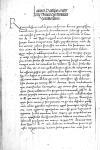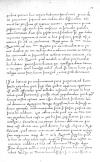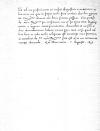⌊⌋ paenultima mensis praeteriti, sed more ⌊Laconum⌋, celeriter et breviter Dominationi Vestrae Reverendissimae, quod nunc etiam facere cogor, nam semper breve tempus ante postae expeditionem mihi datur notitiae, nolunt fortassis, ut multa hinc scribantur, multum etiam de litterarum mearum praesentatione dubito, quia nescio, si redduntur, nullum enim ab eo tempore, quo exivi, recepi responsum, iam praeteriere undecim menses. Cuius sim animi, facilis est coniectura. Ego toties scripsi et nullum tempus mihi {hic} iucundius hic videtur, quam dum scribo illuc et ad illos, ubi et cum quibus libenter essem. Ea voluptate, qua hic afficior, possem pati, quod interdum hostes mei afficerentur. Ago hic hospes et extraneus, ab omnibus ut caveam, necesse est, immo etiam ab iis, qui mihi amicissimi esse deberent. Iste orator, qui nomine ⌊illustrissimae dominae ducis Mediolani⌋ hic agit, ⌊Gotifredus Caraczolus⌋, qui omnes istas moras data opera fecit, vellet enim hic perpetuo in huiusmodi ⌊illustrissimae dominae ducis⌋ expensis manere. Quantum solus mihi molestiae inferat, et illi, qui cum eo sunt, servitores ⌊illustrissimae dominae ducis⌋ sciunt. Cogor ferre omnia et fero patienter, ne ex nostris dissidiis quicquam mali rebus agendis nasceretur, quod summopere cupio. Peractis vero negotiis, cognoscet, me eum esse, quem hactenus non cognovit. Si illis interdum licet canere, qui compedibus vincti in ergastulis durissimos ferunt labores, cur etiam in ho ms. a(!)
⌈oo ms. a(!)
⌉c labyrintho perplexus non iocarer. ⌊Serenissimus dominus meus⌋, duce Reverendissima Dominatione Vestra, dedit me ut tenellum puerum, quem nostri Gregorianum vocant, scholis, quae in hac aula sunt, in  B. Ossol., 176, f. 104r quibus quattuor haec magnae habentur facultates: prima docet patientiam, sequens, non credere, alia dissimulare, ultima et haec potissima est, ingenue mentiri. Quantum in prima profecerim, ipse mihi sum conscius, in secunda cotidie audio lectiones, duae istae posteriores, subtilius quam ego habeo requirunt ingenium, et nemo in his proficere potest, nisi a natura sit ad ea inclinatus. Rogo igitur Dominationem Vestram Reverendissimam: ad ⌊maiestatem regiam⌋ pro me intercedat, ut in primis duabus me non mediocriter eruditum revocet, ne ulterius hic immorando in sequentibus malitia vincat naturam. Credat Dominatio Vestra Reverendissima, quod mirabile in rebus practicandis hic habetur gymnasium, beatus qui intelligit, datur tamen a me opera, quod hucusque nihil aliud quam moram hanc, quam collega meus fecit, lucrati sunt. Sed exitus probabit omnia.
B. Ossol., 176, f. 104r quibus quattuor haec magnae habentur facultates: prima docet patientiam, sequens, non credere, alia dissimulare, ultima et haec potissima est, ingenue mentiri. Quantum in prima profecerim, ipse mihi sum conscius, in secunda cotidie audio lectiones, duae istae posteriores, subtilius quam ego habeo requirunt ingenium, et nemo in his proficere potest, nisi a natura sit ad ea inclinatus. Rogo igitur Dominationem Vestram Reverendissimam: ad ⌊maiestatem regiam⌋ pro me intercedat, ut in primis duabus me non mediocriter eruditum revocet, ne ulterius hic immorando in sequentibus malitia vincat naturam. Credat Dominatio Vestra Reverendissima, quod mirabile in rebus practicandis hic habetur gymnasium, beatus qui intelligit, datur tamen a me opera, quod hucusque nihil aliud quam moram hanc, quam collega meus fecit, lucrati sunt. Sed exitus probabit omnia.
Istas litteras pro confirmatione pacis perpetuae ad ⌊pontificem⌋ facile expedivi, quia fugi illos, quibus negotium cognitum est, et illi officiales, quos adhibui, nesciunt, ut
novi in his rebus, quid fecerunt. Si quicquam aliud expediendum pro
⌊serenissimo domino nostro⌋, optima nunc esset commoditas; scribantur litterae ad dominum ⌊Georgium Turzo⌋, ⌊Augustam⌋. Huic descripsi ordinem, quomodo mihi mittendae sunt. Si forsan praesens non fuero, litterae redibunt. Ego adhuc credo, quod ⌊rex⌋ me tam cito non expediet, licet causa, in qua hic sum, expediatur. Sic enim intellexi a ⌊cancellario⌋. Cur tamen detineri debeam, me praeterit, nisi ob eam rem, quod dicatur: hic esse aliquis a ⌊rege Poloniae⌋, quod nomen ante meum adventum penitus vulgo fuit incognitum. Itaque Dominationi Vestrae Reverendissimae supplico, quid in his ac aliis rebus mihi amplius faciendum restat, me certiorem reddat et litteras ad dominum ⌊Turzo⌋ ⌊Augustam⌋ derigat. Nullum erit periculum, sic enim hic cum factoribus ⌊Welser⌋ et ⌊Fuccarorum⌋ disposui, si in mea absentia
 B. Ossol., 176, f. 104v
litterae ad me perferrentur, ut rursus ⌊Augustam⌋ remittantur. Velim enim ex quo in fatis mihi fuit, ut tamdiu hic agerem, ut ⌊serenissimo domino nostro⌋ bene servire possem.
B. Ossol., 176, f. 104v
litterae ad me perferrentur, ut rursus ⌊Augustam⌋ remittantur. Velim enim ex quo in fatis mihi fuit, ut tamdiu hic agerem, ut ⌊serenissimo domino nostro⌋ bene servire possem.
Cui quaeso Dominatio Vestra Reverendissima per occasionem me et servitia mea longamque meam a viginti annis servitutem commendet et me sibi in dies commendatiorem habeat. Omnis spes mea et si quid adhuc boni in orbe mihi reliquum est, omnisque mea fortuna in manibus Dominationis Vestrae Reverendissimae sita est. Cui me iterum iterumque commendo.
 B. Ossol., 176, f. 104r quibus quattuor haec magnae habentur facultates: prima docet patientiam, sequens, non credere, alia dissimulare, ultima et haec potissima est, ingenue mentiri. Quantum in prima profecerim, ipse mihi sum conscius, in secunda cotidie audio lectiones, duae istae posteriores, subtilius quam ego habeo requirunt ingenium, et nemo in his proficere potest, nisi a natura sit ad ea inclinatus. Rogo igitur Dominationem Vestram Reverendissimam: ad
B. Ossol., 176, f. 104r quibus quattuor haec magnae habentur facultates: prima docet patientiam, sequens, non credere, alia dissimulare, ultima et haec potissima est, ingenue mentiri. Quantum in prima profecerim, ipse mihi sum conscius, in secunda cotidie audio lectiones, duae istae posteriores, subtilius quam ego habeo requirunt ingenium, et nemo in his proficere potest, nisi a natura sit ad ea inclinatus. Rogo igitur Dominationem Vestram Reverendissimam: ad  B. Ossol., 176, f. 104v
litterae ad me perferrentur, ut rursus
B. Ossol., 176, f. 104v
litterae ad me perferrentur, ut rursus 

